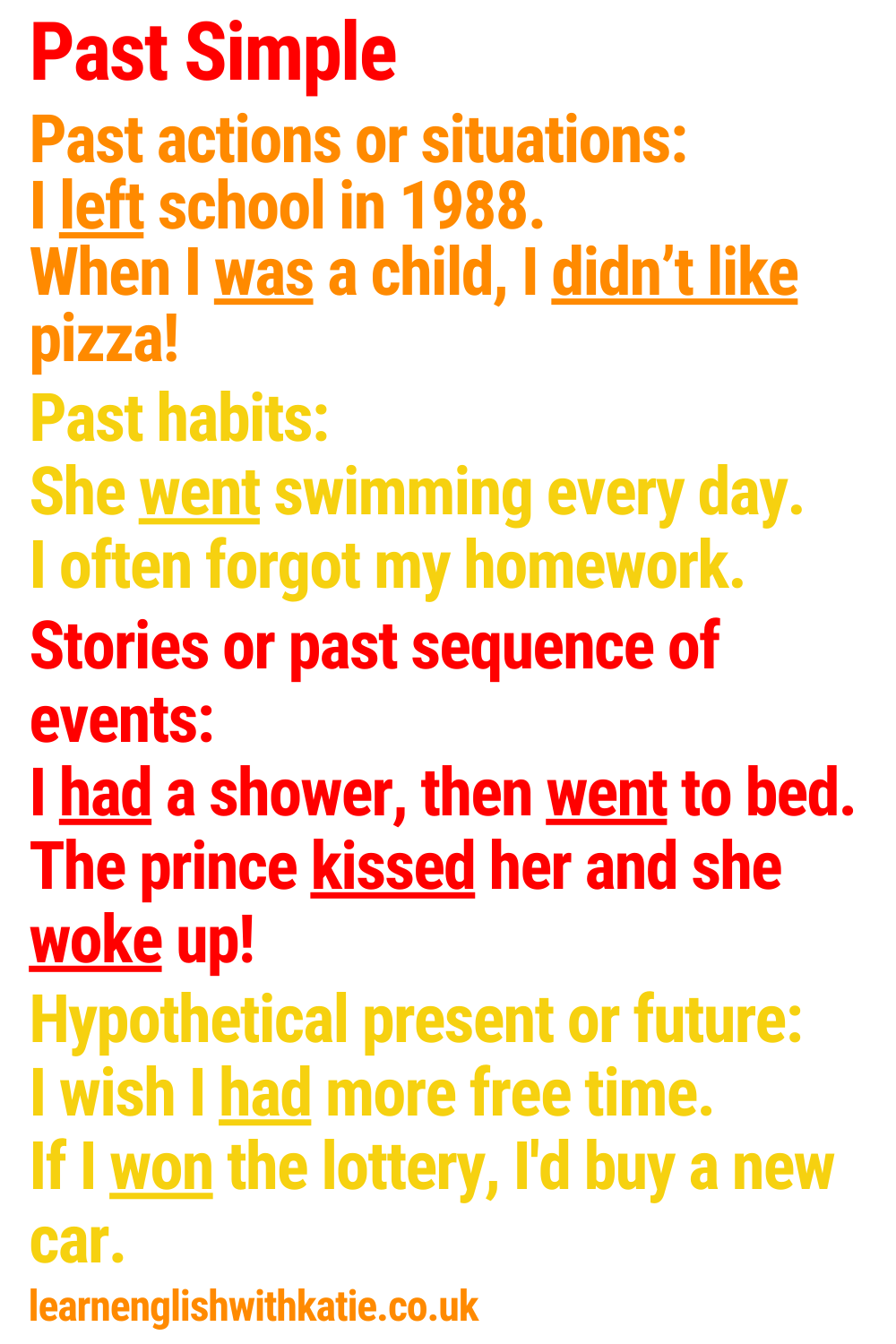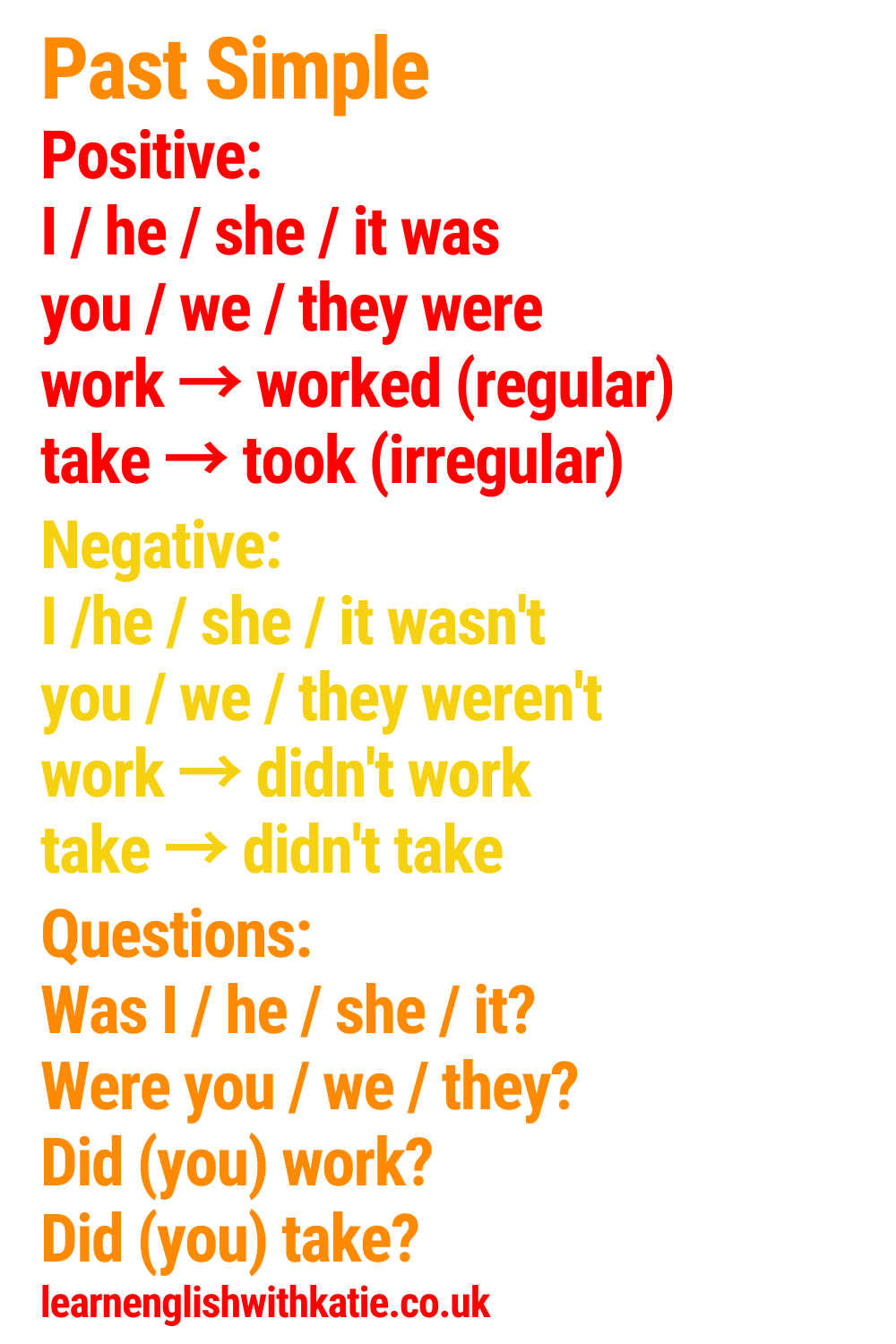|
The past simple is easy enough to understand but it can cause problems because there are so many irregular verbs in English. Also forming negatives and questions is not easy! Read on to learn more. Formation Regular verbs: past simple = the infinitive + “-ed” (or “-d”) Irregular verbs: past simple = verb 2, the second form in a list of irregular verbs, e.g. went, gave, took. Positive: Be: I / he / she / it was, you / we / they were Work: I / you / he / she / it / we / they worked (regular) Take: I / you / he / she / it / we / they took (irregular) Negative: Be: I / he / she / it was not (wasn’t), you / we / they were not (weren’t) Work: I / you / he / she / it/ we / they did not work (didn’t work) Take: I / you / he / she / it / we / they did not take (didn’t take) Questions: Be: Was I / he / she / it? Were you / we / they? Work: Did I / you / he / she / it / we / they work? Take: Did I / you / he / she / it / we / they take? Spelling rules for -ed endings If the verb ends in -e, add -d, not -ed: E.g. smile → smiled, like → liked Change -y to -ied: E.g. try → tried, study → studied Except when there is a vowel, -ay, -ey and -oy: E.g. play → played, enjoy → enjoys Double the consonant: If a verb has one vowel and one consonant at the end, we double the consonant. This only works if the vowel is short and there is one syllable. For example: hug → hugged stop → stopped Don’t double if the verb ends in -w or -x (snow → snowed, fix → fixed) or if there are two vowels (wait → waited) or if there are two consonants (help → helped) If there are two syllables it usually depends on the word stress. If the stress is on the first syllable, don’t double the consonant. offer → offered listen → listened If the stress is on the second syllable, double the consonant: prefer → preferred commit → committed There are some exceptions, of course! In British English, we write “travelled” but Americans write “traveled”. “Focused” and “focussed” are both possible. Uses 1. The action is finished and the time is past: I left school in 1988. We went to France last summer. 2. To describe repeated actions in the past: She went to the cinema every weekend. When I was a child, I took the bus to school every day. I often forgot to do my homework. 3. To say how long something continued when it is no longer true: They were married for ten years but now they are divorced, sadly. I studied German at school for five years. I can’t remember it now! 4. To tell a story or describe a past sequence of events: I had a shower, cleaned my teeth and then went to bed. The prince found Snow White and kissed her. Then she woke up! 5. To describe past states and situations: Shakespeare was a famous playwright. When I was a child, I didn’t like pizza! 6. To talk about the present or future in a hypothetical way: If I won the lottery, I would travel round the world. (This means in the future.) I wish I had more free time. (This means now.) 7. With other tenses: He has just been to Paris. He stayed in a hotel. (with the present perfect) He was having a shower when the phone rang. (with the past continuous) He realised he had forgotten his wallet. (with the past perfect) (More on this in other posts.) Common mistakes 1. He was go to the office yesterday. He was work for eight hours. ❌ He went to the office yesterday. He worked for eight hours ✔️ Just add -ed or use the second form of the irregular verb to make the past tense. Don’t add “was” or “were”. 2. He didn’t liked coffee when he was a child. ❌ He didn’t like coffee when he was a child. ✔️ After “didn’t”, we use the infinitive. 3. Did you bought any milk? ❌ Did you buy any milk? ✔️ This is similar to the last point. In questions with “did”, we also use the infinitive. 4. Lived he in London? / He lived in London? ❌ Did he live in London? ✔️ Most past simple questions are made with “did” and not by changing the word order or just the intonation. (There are exceptions: i) The verb “to be”: He was ... → Was he … ? ii) Modal verbs: You could ... → Could you … ? iii) When asking about the subject: Who wrote Harry Potter? J. K. Rowling wrote Harry Potter. “Who” and “J. K. Rowling” are the subject of the verb.) 5. They decided to went to Spain. ❌ They decided to go to Spain. ✔️ We don’t use the past simple after “to”. We use the infinitive. 6. He drived a Ferrari. ❌ He drove a Ferrari. ✔️ Not all verbs take the -ed ending. There are a lot of irregular verbs which just have to be learnt. 7. I was going for a walk every day. ❌ I went for a walk every day. ✔️ Use past simple for past habits, not past continuous. 8. I was living in Poland for two years. ❌ I lived in Poland for two years. ✔️ Don’t use the past continuous just because it’s a long time. I’ll show you in a future post how to use the past simple and past continuous together but we don’t use the past continuous alone like this. 9. I didn’t finish my homework yet. ❌ (in Britain) I haven’t finished my homework yet. ✔️ In British English, we use the present perfect with “yet”, “just” and “already”, but in America, some people do say “I didn’t finish my homework yet”. 10. I hadn’t a computer. ❌ I didn’t have a computer. ✔️ “I hadn’t” may have been possible in old English but it sounds strange in the 21st century. Form the negative of “had” in the same way as for other verbs with “didn’t” and only use “hadn’t” in the past perfect. If you are wondering what to study next, why don't you try the past continuous here. If you would like more lessons and tips for how to learn English, click the button below and sign up for my newsletters:
0 Comments
Your comment will be posted after it is approved.
Leave a Reply. |
About the blogFollow the blog for mini lessons and tips on how to improve your English. Categories
All
Archives
July 2024
|


 RSS Feed
RSS Feed
